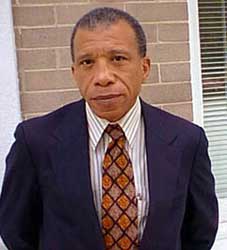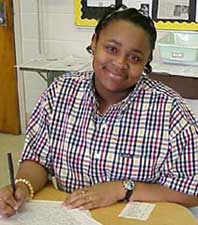Major Works

Jerry Ward, Jr., at the Eudora Welty Symposium in Columbus, Mississippi, 1998 Photo by Nancy Jacobs, SHS
- “Jazz to Jackson to John”
- “Don’t Be Fourteen (in Mississippi)”
- “Your Voice”
- “Something From the Gulf”
- “A common Snapshot” (unpublished)
- “Trueblood”
- “Fusion”
- “The Impossible All These Years”
- “Untitled”
- “From Meditations on Richard Wright: Black Boy”
- Trouble the Water: 250 Years of African American Poetry (editor)
Jerry Ward: A Biography
By Jerri Ward (SHS)
Jerry Washington Ward, Jr. was born in Washington, D. C., on July 31, 1943. He was born to Jerry Washington Ward, Sr., and Mary Theriot Ward. (Ward interview) When he was six years old, his family and he moved to Mississippi. (Abott 416-417)
Jerry Ward attended the ninth grade at a Catholic school called Our Mother of Sorrows High School in Biloxi, Mississippi. He went to the tenth and eleventh grade at Magnolia High School in Moss Point, Mississippi. He did not finish high school because he was admitted to Tougaloo College after he finished the eleventh grade. He received a Bachelor of Science degree in 1964 from Tougaloo College, and in 1966, he received his Master of Science degree from the Illinois Institute of Technology. Ward also received a Ph.D. at the University of Virginia in 1978. (Abbott 416-417).
The first poem ever written by Ward, “The City,” was written in 1959 and has never been published. Ward became interested in writing during his high school years; the first poet he tried to imitate was Carl Sandburg, but James Baldwin has influenced Ward’s writings the most. However, Ward doesn’t have a favorite author because there are so many great authors out there. (Ward interview)
Ward has written several different poems. Some of his many poems are “Jazz to Jackson to John,”, ” Your Voice,” and “Something from the Gulf.” One of his most popular poems is “Don’t Be Fourteen in Mississippi.” “Don’t Be Fourteen in Mississippi” is a poem about growing up in Mississippi during the 1950’s and 1960’s. (Ward 315) Some of his other works include Black Southern Voices, Redefining Black Literary History, and Trouble the Water: 250 years of African American Poetry.
Ward is currently working on a book to be entitled Delta Narrative: Memory, Testimony, and Social Change with Dr. Kim Lacy Rogers. He is also continuing to write poems for a new collection to be called Reading Race and Reading America. (Ward interview)
Ward has lived in Mississippi since 1949 and considers Moss Point, Mississippi, his hometown. Ward enjoys living in Mississippi because his family has been here a long time; in that sense he is rooted here. However, he also has some dislikes about living in Mississippi. “Racism is a permanent feature of life in Mississippi and that produces its own set of headaches,” Ward remarked in an interview.
At the present time Ward is teaching at Tougaloo College and has been since 1970. At Tougaloo College he is the Lawrence Durgin Professor of Literature. He is also a member of Alpha Phi Alpha Fraternity, the Modern Language Association, the College of Language Association, the Authors Guild, and VFW. He also serves on different editorial boards. Some include the Mississippi Quarterly, Literary Griot, African American Review, and many others. He served in the U.S. Army (1968-1970) and did a tour of duty in Vietnam. He received The Public Humanities Scholar Award from the Mississippi Humanities Council in 1998, and has received a Fellowship Award for 1999-2000 at the National Humanities Center in Research Triangle Park, North Carolina.
During his spare time Ward enjoys jogging, listening to blues and jazz, going to the movies, watching special programs especially ETV, and growing herbs.
Ward has some advice for high school students: ” Be serious, don’t pay any attention to so-called peer pressure. Study hard, read widely and wisely in the areas of literature and the sciences.”
Note: Jerry Ward is currently Professor of English at Dilliard University (2002-2003).
Reviews
A Review of “Jazz to Jackson to John“
by Jerri Ward (SHS)
“Jazz to Jackson to John” is a very good poem to read. The poem has multiple meanings. When this poem first starts out, it talks about how the sound of jazz travels. It tells how jazz makes people like the spirit of the Lord at church. Then the poems goes on to tell about the painful lives of African American people, about the slave trade and about lynchings. From the interview that I had with Mr. Ward, I learned that this poem is a tribute to one of his friends, Mr. John Reese. John Reese died of cancer in the fall of 1999. In this poem Ward expresses his feelings about Reese, letting him know that he appreciates everything Reese did. I feel that this poem is really nice. I would recommend it to others. Also, I would like to recommend his poem “Unentitled” to others.
Interview with Jerry Ward, Jr. (2000)
by Jerri Ward (SHS)
When and where were you born?
I was born in Washington, DC, on July 31, 1943.
Your parents’ names?
Jerry W. Ward, Sr.
Mary Theriot Ward
Where did you attend high school and college?
9th grade- Our Mother of Sorrows High School, Biloxi, Mississippi
10th and 11th grade- Magnolia High School, Moss Point, MississippiI didn’t finish high school. I was admitted to Tougaloo College after I completed the 11th grade.
B.S. Tougaloo College 1964
M.S. Illinois Institute of Technology 1966
Ph.D. University of Virginia 1978
Who is your favorite author? What author has influenced you the most?
There are so many good writers in the world that I refuse to name any single one my favorite. The author who has influenced me very much is James Baldwin.
When did you become interested in writing?
I became interested in writing during my high school years? The first poet I tried to imitate was Carl Sandburg.
What kind of student were you in high school?
I was a very serious and productive student. I maintained a high average, probably 96 most grade periods.
Are you working on any books right now?
Yes. I am currently at the National Humanities Center in Research Triangle Park, North Carolina and working on a book to be entitledDelta Narratives: Memory, Testimony, and Social Change with Dr. Kim Lacy Rogers, a colleague from Dickinson College. I continue to write poems for a new collection (as
yet untitled) and essays for a collection to be called READING RACE, READING AMERICA.
Have you received any awards?
Yes. I have a fellowship for 1999-2000 at the National Humanities Center. I received the Public Humanities Scholar Award from the Mississippi Humanities Council in 1998.
Do you have any advice for student attending school today?
Yes. Be serious. Do not pay attention to so-called “peer pressure.” Study hard. Read widely and wisely in the areas of literature and the sciences. Start exploring what is required for careers in the future in the sophomore year, and spend time during the junior year preparing for ACT or SAT examinations, so that you can be admitted to a very good college.
How long have you lived in Mississippi?
Since 1949. My hometown is Moss Point.
Do you enjoy living in Mississippi? Why? Why not?
The question does not have a “yes” or “no” answer. Living anywhere on this planet is a matter of enduring and prevailing, of adapting and of being involved in producing positive changes. I do like living in Mississippi because my family has been there a long time; in that sense I am rooted in the place. What I do as a teacher and writer has a small impact on the quality of life in the state. Nevertheless, the fact that “racism” is a permanent feature of life in Mississippi produces its own set of headaches. And I often want to curse the state for the physical and psychological wounds it has caused. Living in Mississippi is often very much a love-hate relationship.
What do you enjoy doing during your spare time?
Jogging, listening to blues and jazz, going to movies, watching some events (sports) and special programs on television, especially on Mississippi ETV, growing herbs and vegetable, gambling at the casinos in Vicksburg (especially when I am lucky enough to win a few dollars).
Is there any other information you would like to supply?
Given that you are interested in my work as a writer, you should read my poems in MISSISSIPPI WRITERS, Vol. III (Poetry), the introduction to Trouble the Water: 250 Years of African American Poetry (New York: Mentor, 1997), and my introduction for the most recent paperback edition of Richard Wright’s Black Boy. You should give special attention to my signature poem “Jazz to Jackson to John.” That poem has been reprinted more than any other that I have written. I have also edited REDEFINING AMERICAN LITERARY HISTORY (New York: Modern Language Association, 1990) and BLACK SOUTHERN VOICES (New York: New American Library, 1992). You can find some information about these books
on <www.amazon.com> I serve on the editorial boards for such magazines as The Mississippi Quarterly, The Literary Griot, New Literary History, Drumvoices Revue, and the African American Review.I am a member of Alpha Phi Alpha Fraternity, the Modern Language Association, the College Language Association, the VFW and The Authors Guild.
I am a Roman Catholic.
I served in the U.S. Army (1968-70) and did a tour of duty in Vietnam.
I have taught at Tougaloo College since 1970, where I am currently the Lawrence Durgin Professor of Literature in the Department of English. My areas of scholarly interest include American and African American Literature, Literary theory and criticism, the Black Arts Movement, and the works of
Richard Wright, Ishmael Reed, and Lance Jeffers.
Also, I would like to know if you would come and visit my class if you have time one day? I would really appreciate it if you would. I would really like to meet you in person and have a picture with you.
I would be delighted to come to your school early in the fall. I will not be back in Mississippi until June, and by that time your school year will have ended.
Here is an unpublished poem that you can use in your paper:
Green lightening glides,
He surmised, upon the knuckles.The rush of it, the risk of it,
So incredibleIt would magnify an ordinary life
Just where bone might smash
Or skin, perplexed by such power,
Curl back like a red sea.There is something biblical
When a man’s eyes bank fire.
His mouth begs the question
Of covenants struck with air.Copyright 2000 by Jerry W. Ward, Jr.
Related Websites
- Jerry Ward Jr. Biography and listed works
- Review of Troubled Water: 250 years of African American poetry This is a link where you can find a review of Troubled Water.
Bibliography
- Abbott, Dorothy, ed. ” Jerry Ward. “ Mississippi Writers: Reflections of Childhood and Youth: Poetry Vol.II. Jackson: University Press of Mississippi, 1988.
- ” Eudora Welty Writers’ Symposium.”Visions. Summer 1998:12.
- Ward, Jerry. “Don’t Be Fourteen (in Mississippi).” Mississippi Writer: Reflections of Childhood and Youth: Poetry Vol.II. Jackson: University Press of Mississippi, 1988.
- Ward, Jerry. “Jazz to Jackson to John.” Mississippi Writer: Reflections of Childhood and Youth: Poetry Vol.II. Jackson: University Press of Mississippi, 1988.
- Ward, Jerry. “Unentitled.” Mississippi Writer: Reflections of Childhood and Youth: Poetry Vol.II. Jackson: University Press of Mississippi, 1988.
- Ward, Jerry. “Reply.”[online] Available email: [email protected] from [email protected], Mon 24 Apr 2000.
- Ward, Jerry. “Response to research questions.” [online] Available email: [email protected] from [email protected], Tue, 18 Apr 2000.
- Ward, Jerry”Response to Questions 11 and 12.” [online] Available email: [email protected] from [email protected], Tue, 18 Apr 2000.

